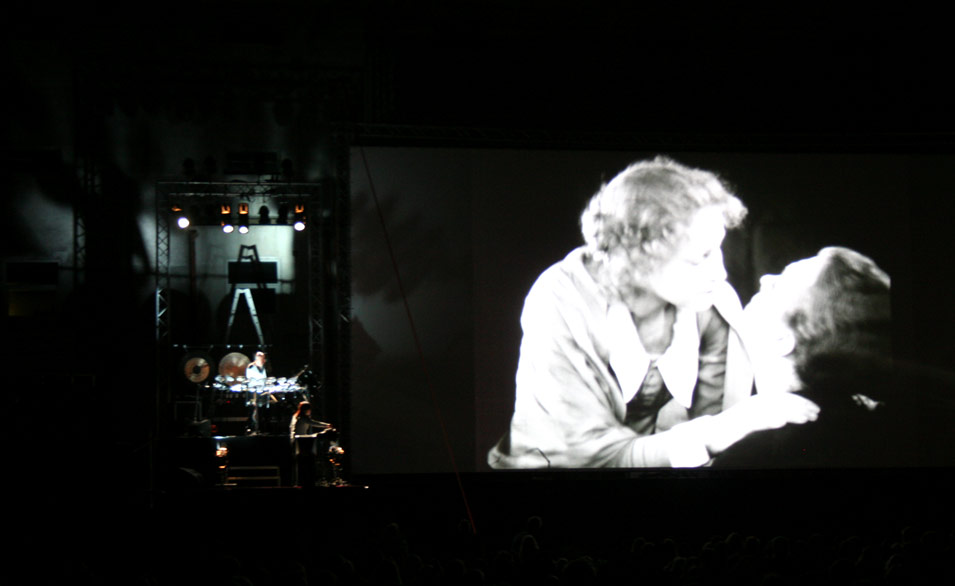METROPOLIS AF FRITZ LANG – Art Zoyd
Islands Brygge v. Silo52 // 01.08.2007 kl. 21.30
Fritz Langs sort/hvid mesterværk Metropolis projiceret på den sidste historiske industribygning i Københavns Havn til livemusik af det banebrydende avant-rock band, Art Zoyd
Der er ganske få film som Fritz Langs sort/hvid-klassiker fra 1927, der har skabt kult, debat og brugt på den storpolitiske arena. Frits Lang fortalte selv, at det var de første skyskrabere i New York, der gav ham inspirationen til filmen, der kort efter premieren kom til at spille en ufrivillig rolle i Hitlers propagandamaskine. Metropolis er et mesterværk af de helt store og giver samtidig et historisk vingesus til den Biennale, som Københavns Internationale Teater lancerer i år. ”Filmen vil forblive uden sidestykke” udtalte mesterinstruktøren Luis Bunuel lige efter premieren i 27.
Ved åbningsbegivenheden for biennalen Metropolis vil det franske avant-rock band Art Zoyd iscenesætte filmen gennem scenografi og deres minimalistiske komposition skabt til netop denne film. Art Zoyd har siden deres store gennembrud i starten af 80erne, hvor de var frontfigurer i den nye bølge af Art Rock eller Avant-Rock, specialiseret sig i at iscenesætte de store klassiske stumfilm gennem scenografier og nye kompositioner ligesom store multimedieshows hører til deres speciale. De har tilmed skabt flere nye musikgenrer som eksempelvis det New York Post anmelderen Erika Milvy kalder gotisk Kammer musik.
Fritz Langs Metropolis og Art Zoyd er en unik cocktail, der efterlader stærke minder.
“their attention to detail is so impressive that their soundtrack effectively works as a kind of abstract shadow narrative (…) Metropolis is an impressive undertaking” TomRidge, The Wire
“Personally, I feel Art Zoyd is one of the most important bands in the world – unsafe and arousing” Glenn Hammett, The Absolute Sound
ABOUT LANG’S METROPOLIS
It is the twentieth century. Metropolis is a gigantic town, made with great skyscrapers at the top of which the masters live in luxurious flower gardens. In the dark depths of the city, countless sub-humans work and suffer silently, riveted to the machine which crushes them like the god Moloch.
A young lady, Maria, preaches resignation to the workers. Using her as a model, the mad professor Rotwang makes a female robot who ironically is to lead these slaves in revolt. Machines are destroyed and Metropolis’s rigourous order is shaken. But Freder Fredersen, the son of the master of Metropolis, with the help of the real Maria, who he loves, intervenes and, in front of the cathedral where the people have gathered, succeeds in reconciling the arm (of labour) with the brain (of capitalism). Can the humanist ideal get the better of the class struggle?
A pinnacle of German cinema: such monsters as Caligari and Nosferatu fade in face of another nightmare, that of modern life. With a scenario inspired by Wells, Lang gives free rein to his architect’s imagination – his initial vocation – with his impressive sets and crowd scenes which he skillfully handles. Coupled with this is the strength of such sequences as the slow march of the slaves in the subterranean city.
Did Hitler, who admired the film, derive from it his concept of the concentration camp? The end of the film however remains ambiguous. In 1959, Lang declared: “The conclusion is false. I did not accept it any more back then when I made the film.”



